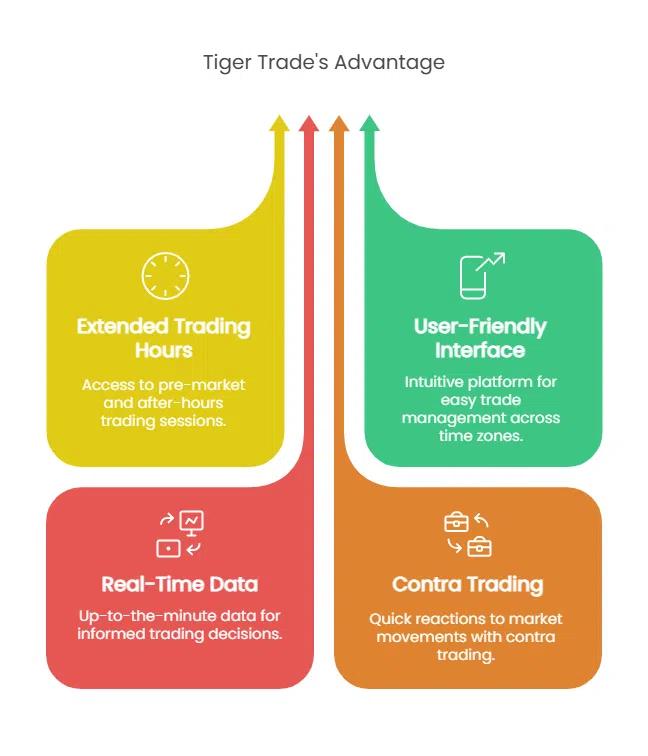The U.S. stock market operates from 9:30 AM to 4:00 PM Eastern Time (ET), which corresponds to 9:30 PM to 4:00 AM in Singapore. This time difference means that individuals in Singapore can observe and respond to market developments in real time during their evening hours—after typical work hours have ended.
This timing can be particularly convenient for those interested in following global financial news, corporate earnings reports, or major economic announcements as they unfold. The U.S. market, home to widely tracked indices like the S&P 500, often reflects global investor sentiment, making it a key point of reference for international market activity. Understanding how different markets align across time zones can help individuals stay informed and make more timely observations about global financial trends.
US stock market trading hours in Singapore time
The US stock market time is divided into three sessions: pre-market, regular trading, and after-hours. Below is a breakdown converted to Singapore Time (SGT):
Trading session | US Eastern Time (ET) | Singapore Time (SGT) - During US DST (Approx. Mar-Nov) | Singapore Time (SGT) - Outside US DST (Approx. Nov-Mar) |
Pre-market | 4:00 AM – 9:30 AM | 4:00 PM – 9:30 PM | 5:00 PM - 10:30 PM |
Regular trading | 9:30 AM – 4:00 PM | 9:30 PM – 4:00 AM | 10:30 PM - 5:00 AM |
After-hours | 4:00 PM – 8:00 PM | 4:00 AM – 8:00 AM | 5:00 AM - 9:00 AM |
Table 1: US stock market hours in SGT
The US market open time (9:30 AM ET) coincides with Singapore’s 9:30 PM, allowing investors to trade major US stock market indices like the Dow Jones or Nasdaq Composite during peak liquidity. Meanwhile, after-hours sessions extend until 8:00 AM SGT, accommodating late-night strategising.
Leveraging pre-market and after-hours trading
Pre-market and after-hours sessions extend beyond the standard U.S. market hours of 9:30 AM to 4:00 PM ET, and can reflect market activity in response to news released outside regular trading times. Examples include earnings announcements or global developments, which may influence investor decisions ahead of the next trading day.
These extended hours can offer insight into how markets might react once regular trading resumes. However, it’s important to note that trading volume during these sessions is typically lower, which can lead to wider bid-ask spreads and increased price volatility. According to the Financial Industry Regulatory Authority (FINRA) study in 2022, after-hours trading represents about 4% of total daily volume.[1]
Being aware of both the potential advantages and limitations of extended trading hours can provide useful context for observing market activity during these periods.
Utilising Tiger Trade for seamless cross-market trading
Accessing the US market requires a capable brokerage platform. Tiger Brokers has emerged as a popular broker in Singapore for accessing international markets. Its platform, Tiger Trade, can offer features beneficial for navigating the US stock market time difference and participating effectively:
1. Access to Extended Trading Hours
A reliable broker offers pre-market and after-hours trading, enabling investors to capitalize on timely opportunities. Tiger Trade generally provides broad access to extended trading hours, but investors should confirm the exact times, as availability may vary.
2. User-friendly interface
Managing trades across different time zones requires a clear and intuitive platform. A mobile and desktop app that is easy to navigate helps investors monitor positions and execute trades efficiently, even during Singapore's late-night or early-morning hours.
3. Real-time data and news
Real-time price quotes, charts, and news feeds provide valuable context for understanding how markets respond to events, including those occurring outside standard U.S. trading hours.
4. Contra-trading
Certain trading platforms, including Tiger Trade, may provide a feature known as contra-trading for specific US stocks, depending on the type of account and prevailing market conditions.
Contra-trading enables investors to both buy and sell the same stock within a single trading day without waiting for the initial transaction funds to fully settle. This means that traders can execute multiple trades on the same stock more quickly, potentially allowing for faster responses to market fluctuations.
However, contra-trading involves particular rules, risks, and possible fees. It is important for investors to thoroughly understand these conditions and assess their risk tolerance before utilizing this facility.
Conclusion
The US stock market operates during hours that differ from Singapore’s time zone, allowing Singapore-based traders to access Wall Street stocks outside their local market hours.
Understanding the US trading schedule and extended sessions helps explain market activity and price movements. Various brokers in Singapore provide access to these markets. Trading during extended hours may involve higher volatility and lower liquidity, which can increase risks.
References
[1]https://www.sciencedirect.com/science/article/abs/pii/S104402832200059X#:~:text=Using%20a%20weekly%20cross%20section,generate%20transitory%2C%20positive%20price%20pressure.
Disclaimer:
The information expressed herein is current and does not constitute an offer, recommendation or solicitation, nor does it constitute any prediction of likely future performance. Investment involves risk. The price of investment instruments can and do fluctuate, and any individual instrument may experience upward or downward movements, and under certain circumstances may even become valueless. Past performance is not a guarantee of future results. In preparing this information, we did not take into account the investment objectives, financial situation or particular needs of any person or affiliated companies. Before making an investment decision, you should speak to a financial adviser to consider whether this information is appropriate to your needs, objectives and circumstances. Tiger Brokers assumes no fiduciary responsibility or liability for any consequences financial or otherwise arising from trading in securities if opinions and information in this document may be relied upon. This advertisement has not been reviewed by the Monetary Authority of Singapore.




